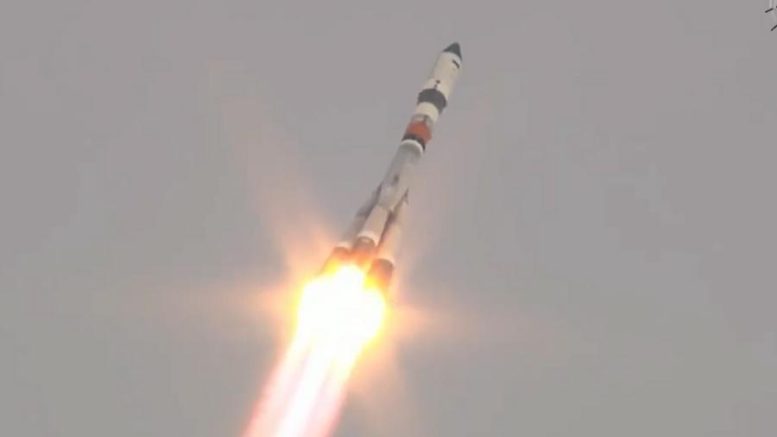
Russia’s Progress 80 resupply ship blasted off in February from the Baikonur Cosmodrome in Kazakhstan. Credit: NASA TV
The next cargo mission to resupply the Expedition 68 crew is prepared to launch to the International Space Station (ISS) on the evening of Tuesday, October 25. In the meantime, the seven people onboard the orbital lab started the work week servicing a pair of spacesuits and working on a host of human research studies.
Counting down to its liftoff at 8:20 p.m. EDT (5:20 p.m. PDT) on Tuesday, the ISS Progress 82 cargo spacecraft stands atop its rocket at the Baikonur Cosmodrome in Kazakhstan. Before docking to the Poisk module at 10:49 p.m. on Thursday, the Roscosmos resupply ship will orbit Earth for two days. NASA TV, on the agency’s app and website, begins its live launch broadcast at 8 p.m. on Tuesday. It will also cover the docking activities beginning at 10:15 p.m. on Thursday.
Commander Sergey Prokopyev and Flight Engineer Dmitri Petelin joined each other on Monday and practiced remotely controlling the Progress 82 cargo craft on a computer. The pair of cosmonauts were inside the Zvezda service module training on the telerobotically operated rendezvous unit, or TORU. This will be needed in the event that the Progress 82 spacecraft is unable to automatically dock to the space station on its own.
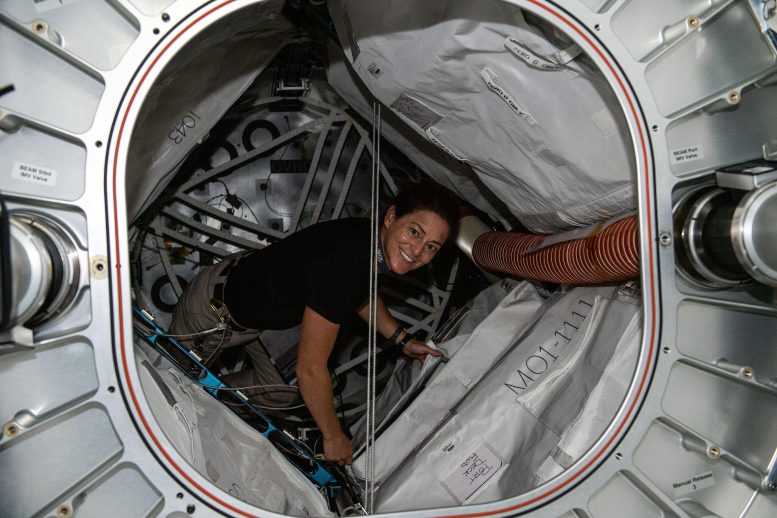
NASA astronaut and Expedition 68 Flight Engineer Nicole Mann poses inside BEAM, the Bigelow Expandable Activity Module, during cargo activities aboard the International Space Station. Credit: NASA
Monday’s schedule for the four astronauts living and working aboard the space station started with biomedical research studies. NASA Flight Engineers Nicole Mann and Josh Cassada began the morning by collecting and processing their blood samples before storing them in a science freezer for future analysis. The two astronauts then joined Frank Rubio of NASA and Koichi Wakata of the Japan Aerospace Exploration Agency (JAXA) for a vision test using a standard eye chart. Next, Rubio assisted Mann as she pedaled on an exercise cycle for a study exploring how weightlessness affects the cardiovascular and respiratory systems. Mann attached Bio-Monitor sensors to herself for the exercise session and recorded physiological data that will be downloaded to doctors on Earth for analysis.
Rubio and Cassada ended the day installing helmet lights and resizing a pair of spacesuits ahead of planned future spacewalks. Mann gathered trash for packing inside the next Northrop Grumman Cygnus cargo vehicle targeted to launch in November. Wakata conducted research into using artificial intelligence to manufacture fiber optic cables in space before cleaning the inside the of Microgravity Science Glovebox.
Cosmonaut Anna Kikina, who launched to the station on the SpaceX Crew-5 mission, spent a portion of her day servicing video and computer hardware before loading data to enable operations with the European robotic arm. She wrapped up her work shift observing Earth’s nighttime atmospheric glow in the near-ultraviolet wavelength.

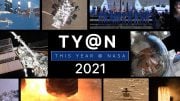
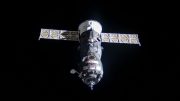
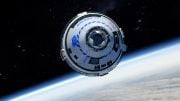
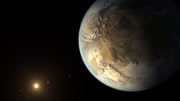
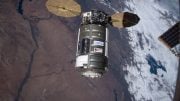
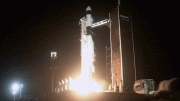
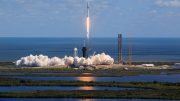
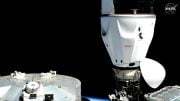
Be the first to comment on "Russian Cargo Mission Nears Launch During Human Research on Space Station"